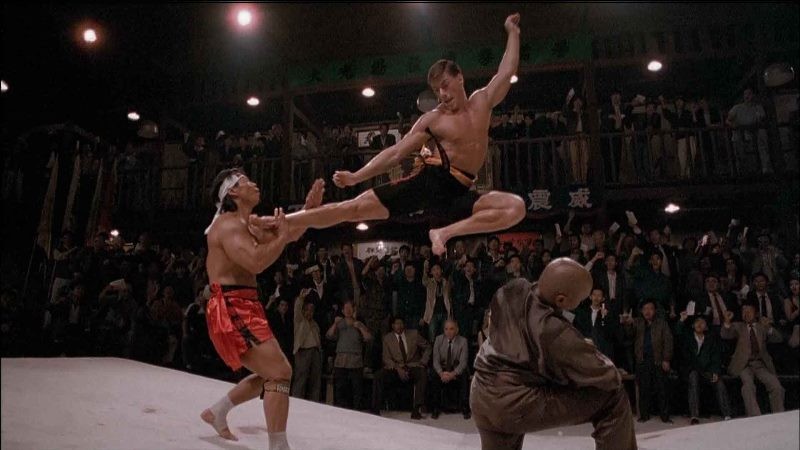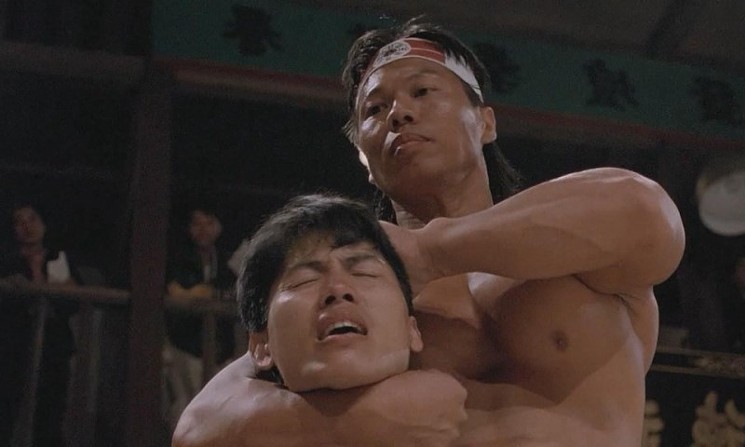Before applying the term "greatest" to any of Belgian martial artiste Jean-Claude Van Damme's films, it's necessary to get everyone on the same page. The "Muscles from Brussels" was never what one would call "thoughtful," or "nuanced," or "competent" as a thespian. His best reviewed films are limited in number and include the The Expendables 2 (an ensemble piece where he's the mostly-offscreen baddie) and JCVD, which really shouldn't count because Van Damme is essentially playing himself.
Level setting aside, Bloodsport is notable both as Van Damme's breakout movie and the one that established every JCVD trademark that would be trotted out in future efforts like Timecop, Street Fighter, the Universal Soldier films and [checks Wikipedia] four of the seven Kickboxer movies. Does he do the splits? Hell, yes. Are there jumping circle kicks? There are, indeed. Is Forest Whitaker in it? You bet your ass.
[Note: Bloodsport is the only movie in which Whitaker and Van Damme appear together.]
Bloodsport tells the allegedly-true-but-probably-bullshit tale of Frank Dux, an American soldier who travels to Hong Kong to participate in an underground, full-contact martial arts tournament called the Kumite. I'll spoil a movie released when Ronald Reagan was still in office by saying Dux does in fact triumph in the tournament, bringing honor to the Tanaka clan (don't ask) and somehow not getting court martialed for going AWOL to fight in the tournament in the first place.
Dubious origins aside (more on that later), Bloodsport deserves at least some credit (or blame) for anticipating — if not outright inspiring — the rise of the Ultimate Fighting Championship, which itself would lead to the current MMA craze. As depicted on screen, the Kumite showcased a diverse array of fighting styles, some proving more effective (Muay Thai) than others (whatever the hell Sadiq Hossein is doing).
Conversely, we could also criticize Bloodsport for giving us unrealistic expectations about what an eventual mixed martial arts tournament would look like. UFC audiences looking forward to monkey fu versus sumo wrestlers instead got a decade's worth of Royce Gracie et al. twisting ankles.
The movie's Big Boss is a fearsome specimen named Chong Li, played by perpetual Chinese baddie Bolo Yeung (Western audiences got their first glimpse of him way back in 1973 as Mr. Han's enforcer in Enter the Dragon). Chong Li's claim to fame, aside from some truly huge pectorals, is that he once killed a man in the ring. It seems unlikely this is a unique occurrence in something called "blood sport," though perhaps no more unlikely than having the Kumite's most storied fighter be a 49(!)-year old whose style consists of being able to absorb punches from dudes two weight classes below him.
The non-fighting scenes are...not much too speak of (as discussed elsewhere, Donald Trump reportedly fast forwards through them). To pad things out, there's a subplot involving two CID agents — apparently on loan from the Sandford Police Department — who are determined to return Dux to the States. Dux also makes the acquaintance of a reporter (Leah Ayres) and ends up sleeping with her. This serves two purposes: 1) it establishes her as someone willing to do anything for a story, and 2) gives us a glimpse of JCVD's sweet can.
And then there's Ray Jackson (Donald Gibb). Dux makes Jackson's acquaintance on a Hong Kong bus, where the latter is "playfully" terrorizing a local woman. Jackson and Dux form an unlikely friendship, and I say "unlikley" because the two have nothing in common beyond being the only Americans in the Kumite. Jackson's undisciplined "style" (best described as 2nd degree bar brawler) almost ends up getting him killed by Chong Li, leading to a hilarious montage of a grieving Dux riding (one assumes) that same bus and wistfully reminiscing about the four days they've known each other.
Shockingly, there may be little in the way of truth behind the story of a secret martial arts tournament as told by a guy claiming to be a heavily decorated Vietnam veteran who offers as proof of winning the Kumite a trophy he (allegedly) bought himself. Dux's first account of the tournament appears in a 1980 issue of Black Belt magazine, which the suits at The Cannon Group apparently felt was accurate enough to support a feature film. Considering some other movies released by Cannon that same year (Alien from L.A., Gor, Going Bananas), this is probably less shocking that it otherwise might be.
Bloodsport will never be regarded as a classic, in even the loosest sense of the word. It currently sits at a dismal 33 percent "Fresh" rating over on Rotten Tomatoes, and the fight scenes (the aforementioned best part) haven't aged particularly well. Dux's own fleeting association with the truth hasn't helped its legacy, but the movie will always occupy a special place in the hearts of those of us who read Black Belt for the Chuck Norris Action Jeans ads.
Support Us
Houston's independent source of
local news and culture
account
- Welcome,
Insider - Login
- My Account
- My Newsletters
- Contribute
- Contact Us
Do-Over Cinema: Bloodsport - Jean-Claude Van Damme's Greatest* Movie Turns 30

Roll for Van Dammage.
[
{
"name": "Related Stories / Support Us Combo",
"component": "11591218",
"insertPoint": "4",
"requiredCountToDisplay": "4"
},{
"name": "Air - Billboard - Inline Content",
"component": "11591214",
"insertPoint": "2/3",
"requiredCountToDisplay": "7"
},{
"name": "R1 - Beta - Mobile Only",
"component": "12287027",
"insertPoint": "8",
"requiredCountToDisplay": "8"
},{
"name": "Air - MediumRectangle - Inline Content - Mobile Display Size 2",
"component": "11591215",
"insertPoint": "12",
"requiredCountToDisplay": "12"
},{
"name": "Air - MediumRectangle - Inline Content - Mobile Display Size 2",
"component": "11591215",
"insertPoint": "4th",
"startingPoint": "16",
"requiredCountToDisplay": "12"
}
,{
"name": "RevContent - In Article",
"component": "12527128",
"insertPoint": "3/5",
"requiredCountToDisplay": "5"
}
]


